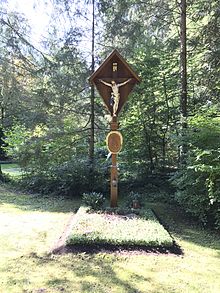Franz Wipplinger (Nazi victim)
Franz Wipplinger (born January 10, 1915 in Munich ; † October 24, 1944 executed in Berlin ) was a candidate for the priesthood for the Archdiocese of Munich and Freising and is listed as a witness of faith in the German Martyrology of the 20th century.
Life
Wipplinger grew up with his parents in the Munich Isarvorstadt in the parish of St. Anton. He attended elementary school on Tumblingerstrasse, then the Theresiengymnasium . He passed his Abitur in 1937 in the seminar for late-career workers in Munich-Fürstenried. He then entered the seminary and studied philosophy and theology in Freising .
After he had already done his labor service in 1937, he was drafted into the army at the beginning of the war. His promotional career took him to NCO in 1941. He was seriously wounded in the east on April 6, 1942, and was then awarded the assault badge . After his recovery he was employed as a clerk in various army departments.
Arrest and execution
In the archives of the Archdiocese of Munich and Freising there are a number of letters that express great dismay about the war. His diary, which became known through denunciation , was his undoing . There he expressed the hope that "despite all the dullness, mass psychosis and fearfulness of the Germans, the enslaved conscience ... will stir and worry, reason and radical rejection will become louder and louder" (entry dated August 28, 1943).
After his arrest on December 4, 1943, Wipplinger was taken to the military prison in Munich for pre-trial detention . It is noted in the interrogation files that “hostile leaflets with dangerous and corrosive content” were found at Wipplinger's “ and that he repeatedly listened to messages from enemy broadcasters ”. The diary shows that Wipplinger must have known the leaflets of the " White Rose ". Franz Wipplinger was sentenced to death on August 31, 1944 by the field war court of the Central Court of the Army in Berlin for undermining his military strength . The execution took place on October 24, 1944 in Berlin-Spandau .
The remains were later transferred to Munich and buried in the grave of his sister Anni Wipplinger in the Munich forest cemetery. It was this sister who continued Wipplinger's correspondence with the seminary even after his arrest and execution. That is why the memory of Franz Wipplinger has remained alive to this day.
Commemoration
The Catholic Church accepted Franz Wipplinger as a witness of faith in the German martyrology of the 20th century .
In seminary Munich a room named after him.
literature
- Peter Pfister: Art .: Franz Wipplinger. in: Helmut Moll (ed. on behalf of the German Bishops' Conference): Witnesses for Christ. The German martyrology of the 20th century. Paderborn et al. 1999, 7th revised and updated edition 2019, ISBN 978-3-506-78012-6 , Volume I, pp. 513-516.
Web links
- Memorial service for Franz Wipplinger. Press release from the Archdiocese of Munich and Freising, October 19, 2009
| personal data | |
|---|---|
| SURNAME | Wipplinger, Franz |
| BRIEF DESCRIPTION | German candidate for priesthood and Nazi victim |
| DATE OF BIRTH | January 10, 1915 |
| PLACE OF BIRTH | Munich |
| DATE OF DEATH | October 24, 1944 |
| Place of death | Berlin |


